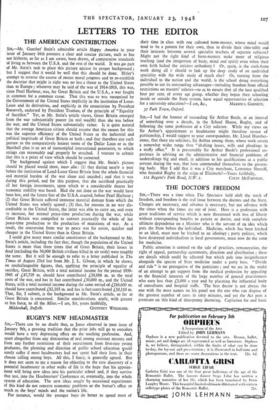LETTERS TO THE EDITOR
. THE AMERICAN CONTRIBUTION
Sta,—Mr. Gunthei Stein's admirable article Happy America in your issue of January 16th presents a clear and concise picture, such as has not hitherto, so far as I am aware, been drawn, of comparative standards of living as between the U.S.A. and the rest of the world. It was ;to part of Mr. Stein's task to place this picture against its proper background ; but I suggest that it would be well that this should be done. Hitler's attempt to reverse the course of recent moral progress and to re-establish the doctrine that might is right was no less a threat to the United States than to Europe ; whatever may be said of the war of 1914-1918, this war, since Pearl Harbour, was, for Great Britain and the U.S.A., a war fought in common for a common cause. That this was so was recognised by the Government of the United States implicitly in the institution of Lena- Lease and its derivatives, and explicitly in the enunciation by President Roosevelt, endorsed by President Truman, of the principle of " Equality of Sacrifice." Yet, as Mr. Stein's article shows, Great Britain emerged from the war substantially poorer (in real wealth) than she was before the war, and the United States substantially richer. It is quite natural that the average American citizen should assume that the reason for this was the superior efficiency of the United States or the industrial and political ineptitude of Great Britain or both ; and that therefore any such gesture as the comparatively lenient terms of the Dollar Loan or as the Marshall plan is an act of tmexanipled international generosity, to which strings can reasonably and properly be attached. I venture to submit
that this is a point of view which should be corrected. •
The background against which I suggest that Mr. Stein's picture should be placed would show, inter di: : (1) that during nearly a year before the institution of Lend-Lease Great Britain bore the whole financial and material burden of the war alone and unaided ; and that it was during this period, and for this purpose, that she sacrificed practically all her foreign investments, upon which to a considerable degree her economic stability was based. Had she not done so the war would have been lost, and the future fate of the U.S.A. assured, before Pearl Harbour ; (2) that Great Britain suffered immense material damage from which the United States was wholly spared ; (3) that, for reasons, in no way dis- creditable to the United States, the latter was able to carry on, and even to increase, her normal peace-time production during the war, while _Great Britain was compelled to convert practically the whole of her peace-time production to the production of munitions of war. As a result, the conversion from war to peace was far easier, quicker and cheaper in the United States than in Great Britain.
I could give many more similar constituents of the background to Mr. Stein's article, including the fact that, though the population of the United States is more than three times that of Great Britain, their losses in dead (excluding the 50,000 British civilians killed in air raids) were roughly the same. But it will be enough to refer to a letter published in The Times of August 23rd last from Mr. J. L. Gibson, in which he shows, on unohallengeable figures, that, applying the principle of equality of sacrifice, Great Britain, with a total national income for the period 1939- 1945 of £47,719 m. should have contributed £18,088 m. to the total costs of the war, and has in fact contributed £30,000 m., and the United States, with a total national income during the same period of,£216,600 m. should have contributed £82,103 m. and has in fact contributed £10,110 m. That, Sir, I submit, is the background to Mr. Stein's article, so far ai Great Britain is concerned. Similar considerations apply, with greater or less force, to all the Allies.—I am, Sir, yours faithfully,






























 Previous page
Previous page